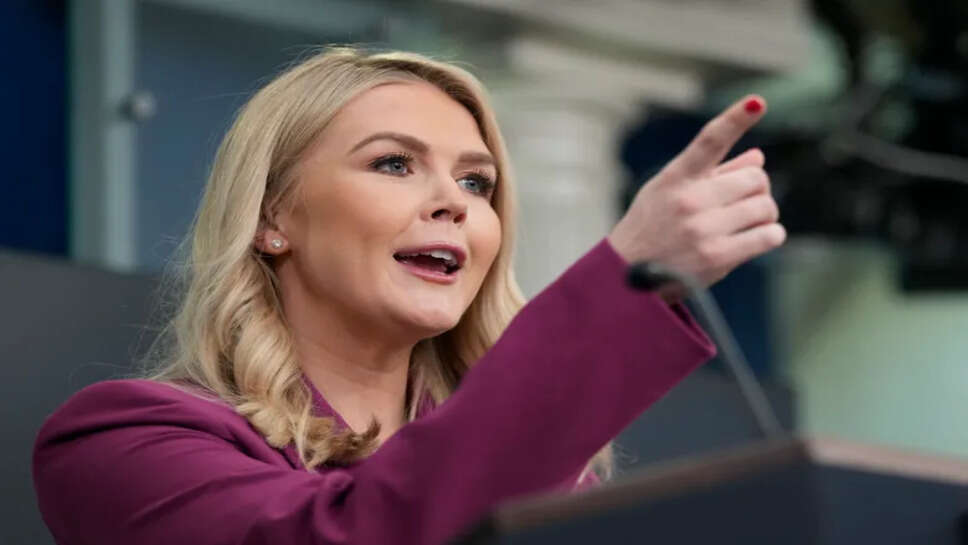Trump Credited With Calming India-Pakistan Relations, WH Says Nobel Prize Due

In an unexpected yet emphatic assertion, the White House has claimed that former U.S. President Donald J. Trump played a crucial role in easing several global conflicts during his tenure — including the long-standing India-Pakistan tensions — and should be considered a serious contender for the Nobel Peace Prize.
Speaking to reporters at a routine press briefing, the White House Press Secretary passionately defended Trump’s foreign policy record, crediting him with reducing hostilities across Asia, the Middle East, and parts of Africa. According to her, his actions — often unorthodox and controversial — created an environment of cautious diplomacy, even between bitter rivals.
The ‘Trump Doctrine’ of Peace
The WH press secretary elaborated on what she called the “Trump Doctrine” — a mix of high-stakes diplomacy, economic pressure, and unconventional engagement with adversaries. She argued that while critics dismissed his style as erratic, it yielded tangible results.
“When you look at the Trump administration’s engagement with nuclear North Korea, the Abraham Accords in the Middle East, and even the surprising de-escalation between India and Pakistan following the Pulwama-Balakot episode, you begin to see a pattern — a clear intent to bring peace without endless war,” she said.
India-Pakistan: A Case in Point
One of the most attention-grabbing remarks was the press secretary’s assertion that Trump played a “quiet but firm role” in reducing the tensions between India and Pakistan after the 2019 Pulwama terror attack and India’s retaliatory strikes in Balakot.
“President Trump had open lines of communication with both Prime Minister Modi and then-Prime Minister Imran Khan. His behind-the-scenes diplomacy helped cool tempers when the region was on the brink of full-blown war,” she stated.
She added that Trump’s neutral positioning and backchannel outreach through military and diplomatic aides provided the space needed for both countries to back down without appearing weak domestically.
Middle East Achievements Highlighted
The press conference also highlighted the Trump administration's success in brokering normalization deals between Israel and several Arab nations — the so-called Abraham Accords — as another reason he deserves Nobel recognition.
“These were historic deals between nations that had no formal diplomatic ties for decades. Peace was brought where war once loomed. That is the very essence of Nobel-worthy diplomacy,” the press secretary argued.
She noted that Trump’s approach broke with decades of status quo thinking and yielded faster, more results-oriented agreements.
Critics Call It Political Posturing
Unsurprisingly, the reaction from opposition leaders and foreign policy analysts was swift and skeptical. Many dismissed the White House’s claim as part of Trump’s ongoing political brand-building strategy as he eyes another presidential run.
“Trump’s foreign policy often destabilized allies and emboldened strongmen,” said one analyst. “Peace wasn’t achieved because of his diplomacy—it was in spite of it, or due to regional actors acting responsibly.”
Others pointed to rising tensions with Iran, the abrupt withdrawal from Syria, and a transactional approach to NATO as examples of disruption, not diplomacy.
Supporters Rally Behind Nobel Nomination Idea
Despite criticism, Trump’s supporters have latched onto the Nobel Peace Prize idea with enthusiasm. On social media, hashtags like #TrumpForNobel and #PeaceThroughStrength began trending within hours of the press briefing.
“Name another president who walked into North Korea, stood between Saudi and Israel, and calmed India-Pakistan tensions,” wrote a prominent Republican senator on X (formerly Twitter). “If that’s not Nobel Peace material, I don’t know what is.”
Some conservative think tanks are reportedly preparing formal nominations to submit to the Nobel Committee ahead of the next cycle.
India and Pakistan’s Take on It
Official reactions from New Delhi and Islamabad were more measured. While both countries avoided commenting directly on Trump’s candidacy for the Nobel, insiders acknowledged that the U.S. played a “quiet but stabilizing role” during the 2019 post-Balakot phase.
A retired Indian diplomat said, “While Trump’s involvement was not always welcome publicly, his team’s engagement with both sides helped lower temperatures in the crucial days following the airstrikes. It’s fair to say the U.S. influence mattered.”
From Pakistan, a former military spokesperson suggested that Trump’s neutral tone and non-interventionist rhetoric gave Pakistan space to de-escalate without political backlash.
Nobel Committee Yet to Respond
The Nobel Peace Prize Committee based in Oslo, Norway has not officially responded to questions about Trump’s candidacy. Traditionally, the Committee does not confirm or deny nominations, even if they are made publicly.
That said, Trump has previously been nominated for the prize by various European MPs and right-leaning academics, though he has not been shortlisted.
Peace vs Personality
The debate now seems to be not just about Trump’s policy achievements, but about whether the Nobel Peace Prize — traditionally awarded to figures like Nelson Mandela, Mother Teresa, and Malala Yousafzai — should consider someone as polarizing as Trump.
Can peace be measured purely in outcomes, regardless of personality, approach, or controversy?
That question remains open, but what’s clear is that Trump’s camp sees the Nobel as not just a prize, but as validation of his legacy — a legacy they claim has been buried beneath the noise of tweets, trials, and turmoil.
With U.S. elections looming and Trump likely to feature prominently in the political narrative again, the Nobel talk may be part of a broader campaign to reposition him not just as a disruptor-in-chief, but as a global peacemaker.
Whether that claim will find global agreement or not, one thing is certain: Trump continues to dominate headlines, spark debate, and, like him or not, shape how the world remembers recent history.
.jpg)